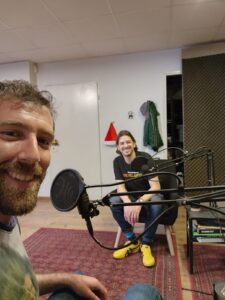Software engineering is a rapidly growing field, with bootcamps and online resources making it easier than ever for anyone to learn how to code. But for experienced engineers, where can they go to continue developing their skills and leveling up in their craft? Until now, there has not been a clear answer to this question.
In episode 96 of “High Tech on the Low,” On Freund, CEO and co-founder of Wilco, shares his insights on how his continuous learning platform is helping engineers of all levels hone their skills through hands-on challenges that simulate real-world development scenarios.
Episode Live Now on Spotify!
Episode Live Now on Apple!
Democratizing Development
In the world of software engineering and development, there is a lack of support for more veteran engineers when it comes to improving their skills. Why would this be important, you may be asking? Well, at the end of the day, while it is important to provide opportunities to novices entering the field, it is the experienced developers and engineers that have the ability to push much of the industry forward. Their knowledge and experience is what keeps them developing, exploring, and creating new solutions and so they must be up-to-date when it comes to changes, risks, and more.
Likewise, if all of their time improving is spent only working on certain work-specific challenges, then these engineers may not progress in as much of a comprehensive way as is required for the industry. Their skills may become stagnant, which is problematic in a field that changes almost daily. As such, they could be unprepared when novel situations arise on the job.
Therefore, the goal of Wilco is to provide a platform that offers hands-on challenges that simulate real-world scenarios, helping experienced engineers develop the skills they need to succeed in their careers. “We believe that everyone should have the opportunity to develop their skills and achieve their full potential, not just beginning developers and engineers,” On adds. From novices to industry veterans, all engineers can benefit from specially-catered simulations that allow professionals to level up in certain skills and be ready for real-world challenges. This approach helps to keep engineers updated and bridge the skills gap, preparing professionals for new industry-wide developments and obstacles of the future.
Why Games Are the Way to Learn
Continuous education is critical for professionals in any field, but it is particularly important for engineers. According to On, Wilco provides engineers with the tools they need to continue learning and growing throughout their careers, in the same way accountants or doctors must take continuous education courses to remain certified. Wilco’s approach to learning is also designed to be fun and engaging, using game-like mechanics to make learning more effective.
“Continuous education is critical for professionals in any field,” says On, and the more enjoyable it is, the more likely people will want to actually do it. Wilco’s ‘quests’, as the company puts it, are designed to be engaging and interactive, just like a regular computer game with challenges, scores, and so on. “They provide instant feedback, which is essential for learning and retention. You can even build your own quests as you see relevant for the wider community.” Since games are a powerful tool for learning, On saw their unique application in the field of software engineering as a means of bringing engineers more into the continuous learning fold so engineers can be constantly developing skills and building expertise and sharing knowledge with each other. Truly a more holistic, yet fun, learning solution.
The Future of Continuous Education for Engineering Professionals
As the world of work continues to evolve, the need for continuous education is becoming increasingly important. In the tech industry, where new technologies and best practices are constantly emerging, the need for continuous learning is particularly acute. Solutions like Wilco are helping to democratize development and engineering education, beyond the classroom or traditional learning platform. Instead, they provide professionals with the tools they will actually need to be successful in their current jobs and jobs in the future by focusing on real scenarios that mimic the current engineering landscape.
Moreover, as mentioned above, the platform also offers developers and others to add quests themselves which helps other engineers learn, from their peers, what is actually relevant in the job market today. With Wilco, the future of work looks brighter than ever, especially as an engineer. By embracing this new way of continuous learning and development, engineering professionals can thrive in their careers and achieve their full potential.























